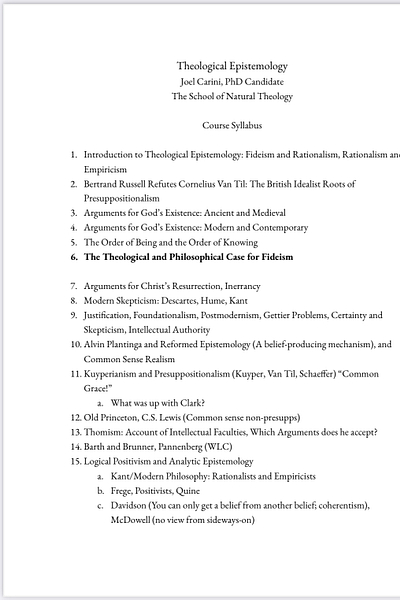The deepest divide in the Christian theory of knowledge is on the matter of how the order of being relates to the order of knowing. God is the first thing in the order of being. Is he the first thing in the order of knowing also?
That is the subject of this fifth lecture of my course Theological Epistemology. If you want to understand better the argument for what I call Christian empiricism, and is sometimes called “classical apologetics,” or Thomism, you’ll want to subscribe to get access to today’s lecture.
In this lecture we’ll consider why theological fideists and theological rationalists are actually on the same team: Team “Start from God.” The opposing team are theological empiricists, who trace their philosophical heritage to Aristotle, and their theological heritage to Aquinas. Appearances are also made by Hegel, Van Til, and the authors of Classical Apologetics, R. C. Sproul, John Gerstner, and Arthur Lindsley.
The introduction to the lecture is free, but you’ll have to subscribe to access the rest of the lecture.
Lecture 5: The Order of Knowing and the Order of Being
Course Syllabus
Lecture Contents
Intro: The Fideist-Rationalist Divide on the Order of Knowing and the Order of Being
Aristotle on the Order of Demonstration
Aquinas on Demonstrating God’s Existence
Hegel: Does God depend on something else?
Van Til Ignores the Distinction
“Classical Apologetics” on the Starting-Point of Knowledge
1. The Fideist-Rationalist Divide on the Order of Knowing and the Order of Being
In the intro we consider the divide between theological fideists and so-called theological rationalists on the relationship of the order of knowing to the order of being. To quote Barthian theologian Thomas Torrance, “There can be no true ordo cognoscendi (order of knowing) which is not based upon an ordo essendi (order of being).” The fideists hold that, since God is the foundation of all that is, he must also be the first object and axiom of our knowledge.
The so-called theological rationalists reply that, to quote William Lane Craig, “God is always first in the order of being; but He may be later in the order of knowing.”
(By the end of this lecture, we will discover that the divide between fideists and rationalists, on the one hand, and empiricists, on the other, is the real divide in theological epistemology.)
In the following section of the lecture, we’ll see Aristotle himself defend the distinction between the order of being and the order of knowing. In the process, he takes to task “the advocates of circular reasoning…” Get a paid subscription to access!





